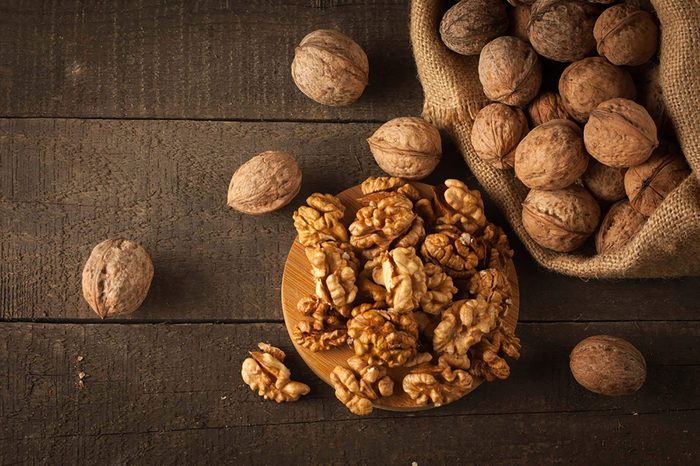
Walnuts
Walnuts are a good source of tryptophan, a sleep-enhancing amino acid which helps make serotonin and melatonin, the “body clock” hormones that set your sleep-wake cycles. University of Texas researchers also found that walnuts contain their own source of melatonin, unlike other foods that help you sleep, which may help you fall asleep even faster. Here are some other health benefits of walnuts (that won’t put you to sleep).
Get The Healthy @Reader’s Digest newsletter
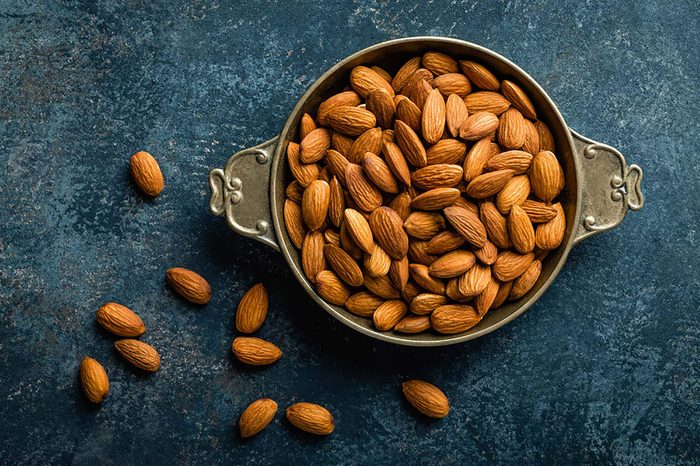
Almonds
Almonds are rich in magnesium, a mineral needed for quality sleep (and for building bones). Adults who took a magnesium supplement before bed reported being able to fall asleep faster, getting more quality sleep at night, and being able to wake up on time more easily, according to a study published in the Journal of Research in Medical Sciences. But you don’t need to take a pill—almonds are a delicious source of magnesium.
Sleep Better Naturally Without Drugs: Sleep Doctors Confess Their Favorite Tips
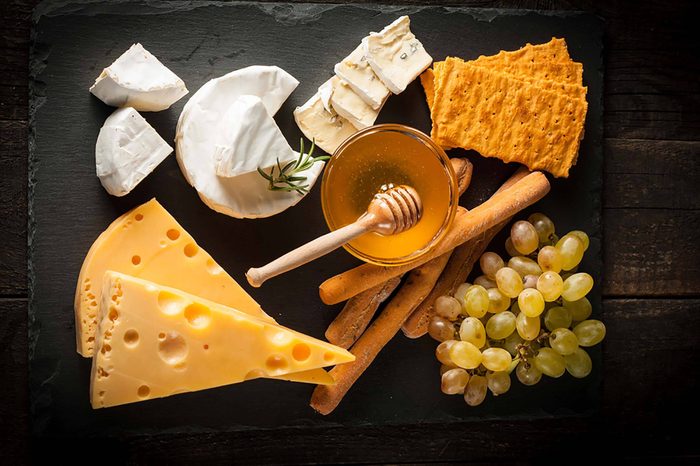
Cheese and crackers
Old wives’ tales suggest that warm milk can make you sleepy, but it turns out there is actually science to back this up. Studies have found that many dairy products can help you sleep. Calcium, found in cheese, yogurt and milk, helps the brain use the tryptophan found in dairy to manufacture sleep-triggering melatonin. Calcium also helps regulate muscle movements, which means fewer sleep-busters like cramps or restless legs.
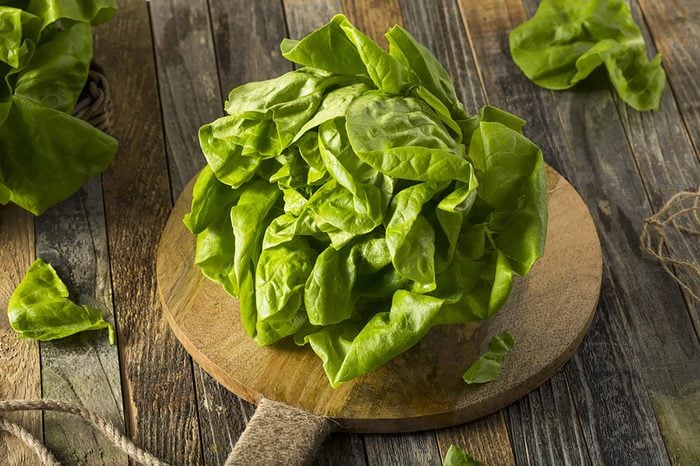
Lettuce
A salad with dinner could speed up your bedtime. Lettuce contains lactucarium, which has sedative properties, according to a study published in Food Science and Biotechnology. Romaine lettuce has the highest content of this compound, making it ideal for sleep. If you don’t feel like noshing on a head of lettuce, you can try this brew from the book Stealth Health: Simmer three to four large lettuce leaves in a cup of water for 15 minutes. Remove from heat, add two sprigs of mint, and sip just before you go to bed.
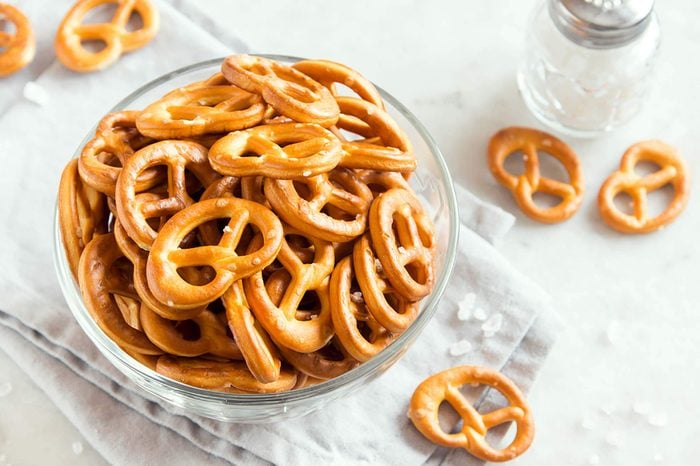
Pretzels
Foods like pretzels and corn chips have a high glycemic index. After eating them, you’ll have a natural spike in your blood sugar and insulin levels, shortening the time it takes you to fall asleep, according to a study published in the American Journal of Clinical Nutrition. Normally, you want steady levels to avoid mood swings and insulin resistance. (In those cases, reach for one of these 10 delicious low-glycemic snacks.) But if you are looking to get rest, the blood sugar and insulin increase helps tryptophan enter your brain to bring on sleep.
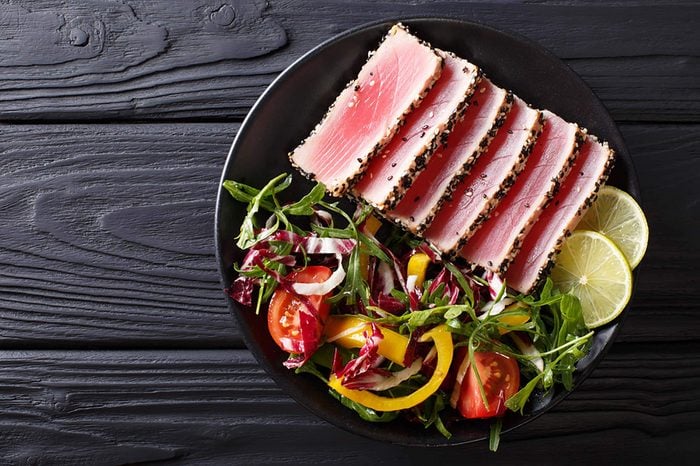
Tuna
Vitamin b6 is sometimes called “the sleep vitamin,” as your body needs it to make melatonin and serotonin. Not only does it help you fall asleep faster but it may also give you more vivid, lucid dreams, according to a study published in Perceptual and Motor Skills. Fish such as tuna, halibut, and salmon are high in vitamin B6, as are raw garlic and pistachio nuts.
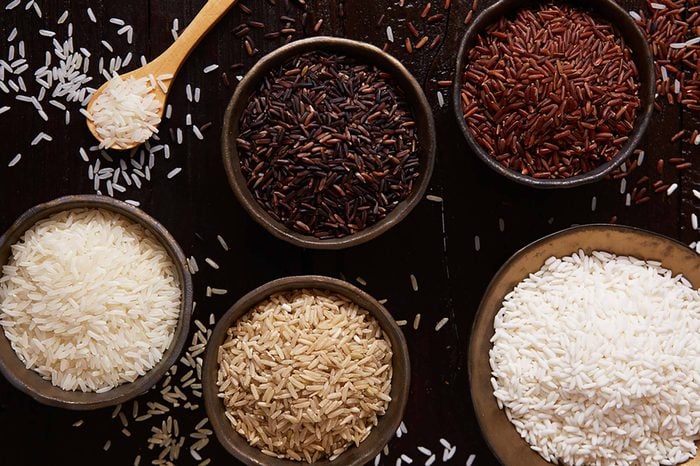
Rice
White rice has a high glycemic index, so eating it will significantly slash the time it takes you to fall asleep, according to the AJCN study. Jasmine rice had the most sleep-enhancing properties according to the researchers.
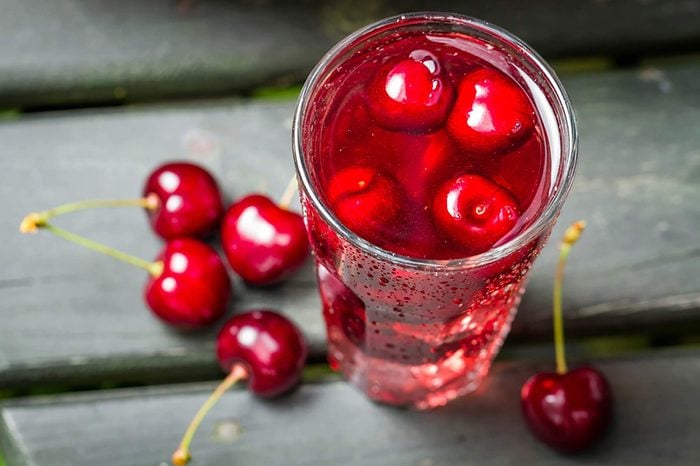
Cherry juice
A glass of cherry juice could make you fall asleep faster, according to a study published in the Journal of Medicinal Food. Tart cherries naturally boost levels of melatonin. In the study, subjects who drank cherry juice experienced some improvement in their insomnia symptoms compared to those who drank a placebo beverage.
The Best Juice to Sip on To Reduce Inflammation, Says Dietitian
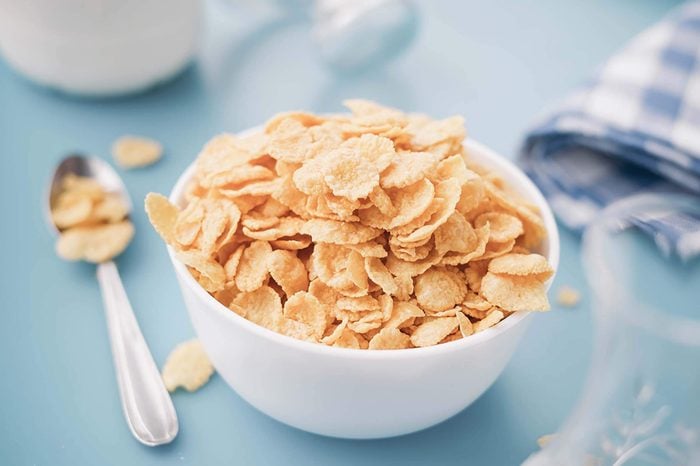
Cereal
A bowl of your favorite flakes before bed could help you get better sleep, according to the National Sleep Foundation. The combination of the carbohydrates (from the cereal) and calcium (from the milk) work together to send you to Sleepytown.
8 Little Changes You Can Make to Sleep Better in Just One Day
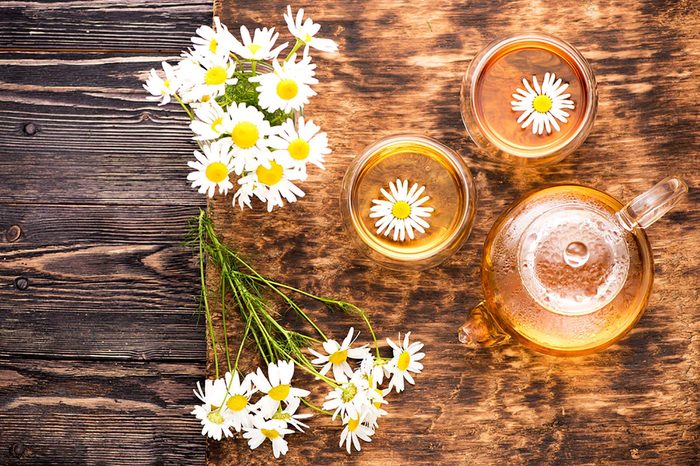
Chamomile tea
Sipping a cup of stress-busting chamomile tea will help you sleep better, according to a study published in the Molecular Medicine Report. According to researchers, drinking the tea is associated with an increase of glycine, a chemical that relaxes nerves and muscles and acts as a mild sedative.
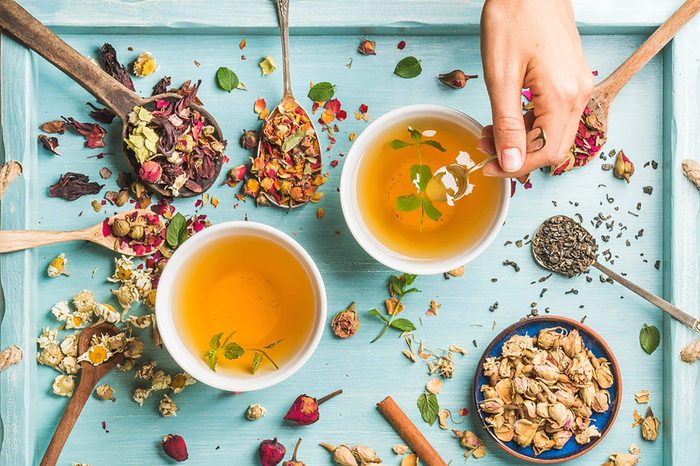
Passionfruit tea
Chamomile isn’t the only herbal tea that will help you sleep. Drinking a cup of passion fruit tea one hour before bed improved sleep quality according to a study published in Phytotherapy Research. Researchers believe that Harman alkaloids—chemicals found in high levels in the flower—act on your nervous system to make you tired.
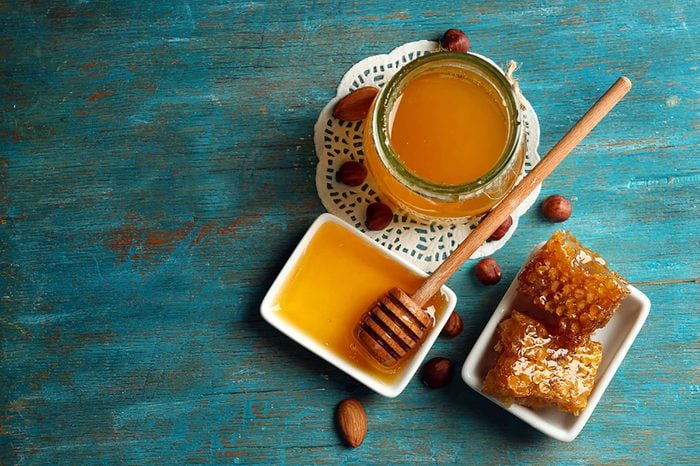
Honey
Sweet, sticky honey, on its own or mixed into herbal tea, may be the perfect bedtime treat, according to researchers. Not only do the carbs help you fall asleep quicker but honey can also quiet a cough, helping you to sleep more soundly even when you’re sick, according to a study published in Pediatrics.
12 Innocent Habits That Are Completely Ruining Your Sleep Quality
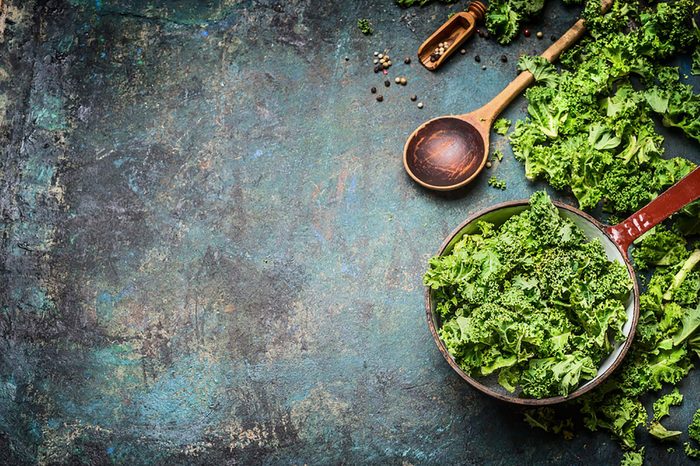
Kale
Green leafy vegetables like kale are loaded with calcium, which helps the brain use tryptophan to manufacture melatonin. Spinach and mustard greens are other good options. Blend them into a smoothie for a soothing and healthy bedtime snack.
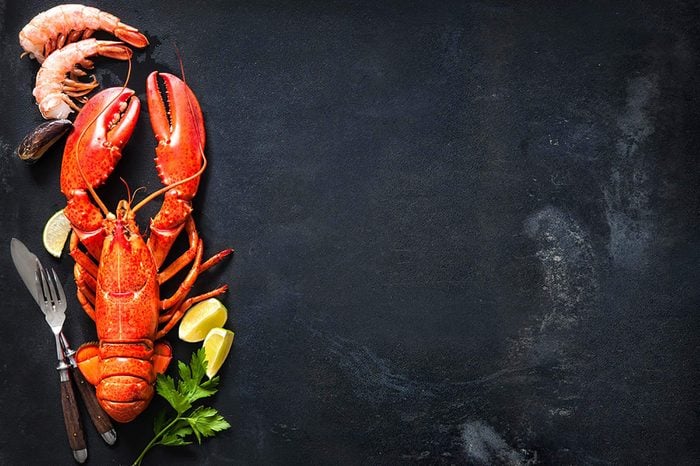
Shrimp and lobster
Shellfish and crustaceans, like lobster and shrimp, are another good source of tryptophan, which improves sleep. People who eat seafood at least once a week not only reported better sleep but had better cognitive functioning the following morning, according to a study published in Nature.
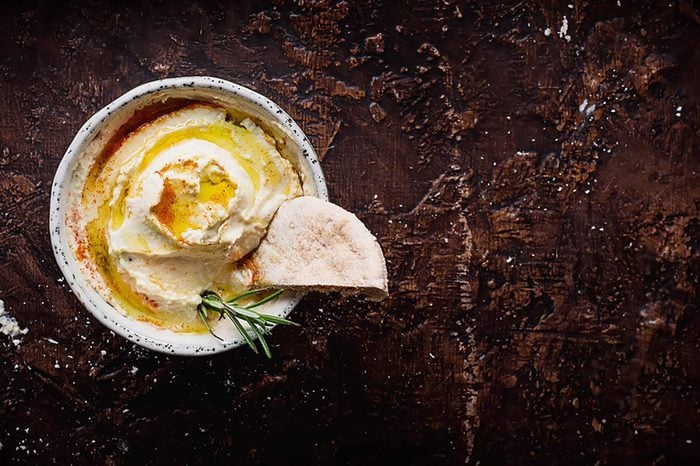
Hummus
Try swapping out those milk and cookies for hummus and whole grain crackers. Beans, including chickpeas and red beans, can improve your sleep, according to a study published by the American Society of Agronomy. They are high in fiber, which will help keep you full, and are also a good source of tryptophan.
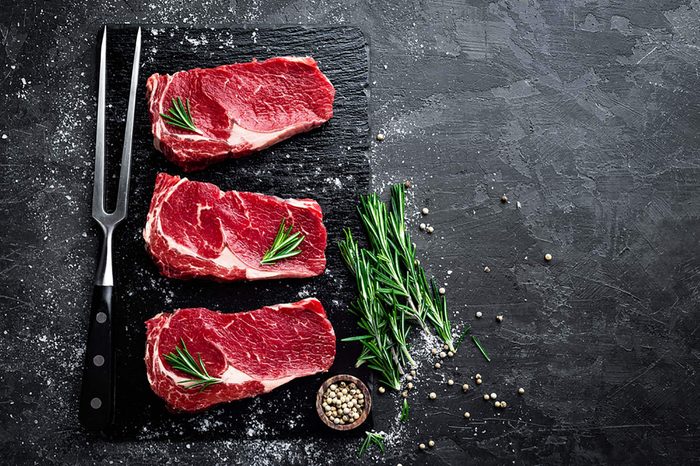
Elk
Elk meat has nearly twice the tryptophan as turkey breast, meaning you’re much more likely to nod off after eating it, especially with a side of carbohydrates to help the tryptophan reach the brain.
For more wellness updates, follow The Healthy on Facebook, Instagram, and Twitter. Keep reading:
- Is King Charles III Healthy? Here’s How One Doctor Interprets the Clues
- Here’s How Often You Should Have a Bowel Movement, Says a Gastroenterologist
- Alton Brown’s #1 Best Recipe for a Sharper Brain
- The 5 Best Yoga Poses for a Healthier Gut, from a Registered Yoga Teacher